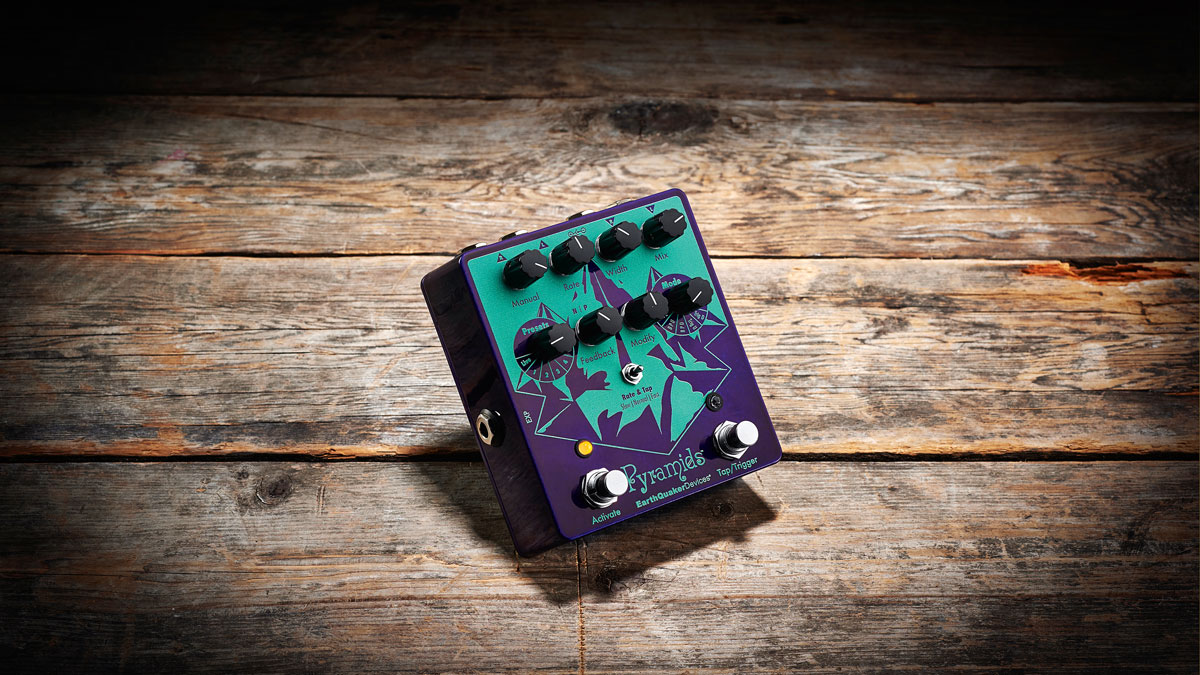MusicRadar Verdict
An incredibly comprehensive and inspiring array of studio quality flanger sounds crammed into a very approachable pedal.
Pros
- +
Extensive flanging effects.
- +
Broad parameter ranges.
- +
Stereo and mono connectivity.
Cons
- -
Not MIDI compatible.
- -
Expression pedal controls.
- -
‘Manual’ function only.
MusicRadar's got your back
When plugging in to a new pedal, it’s always a good sign when you suddenly find that two hours have gone past in the blink of an eye and a bunch of new riffs have appeared out of nowhere.
This was our immediate experience with EarthQuaker Devices’ new stompbox: the Pyramids stereo flanger. With a huge range of flanging effects to explore, it is, in the best possible sense, easy to get lost in its mesmerising maze of bugged out modulation.
If you want to quickly take full advantage of the pedal’s extensive creative potential, however, we highly recommend spending a few moments reading the manual beforehand in order to familiarise yourself with some of the fresh concepts the guys at EarthQuaker have cooked up, or you might find yourself a bit too lost.
The Pyramids’ wet/dry Mix control is a tasteful addition to the standard flanger parameters of Rate, Width and Feedback, while the Manual knob adjusts the effected sound’s delay time and is assignable to an expression pedal. Each of the Pyramids’ eight modes - effectively five distinctly different sounding flange effects (Classic, Barber Pole Up/Down, Through-Zero, Trigger Up/ Down and Step/Random) - includes a unique parameter which can be adjusted with the Modify knob.
Sounds
The Pyramids’ range of sounds extends from mild to extreme, from a subtle undercurrent of movement and enhanced dimension, to the sound of a fleet of flaming UFOs crash landing in a giant kettle drum.
If you happened to be going for the much less subtle end of things, keeping the sound of your guitar faithfully intact might be a bit of a moot point, but it’s worth mentioning that the Pyramids keeps the dry signal within the analogue domain at all times. Having said that, with ADCs and DACs operating within a range of 20Hz-20kHz at a 24-bit depth and 96kHz resolution, most non-super heroes would be hard pressed to hear the difference... And, yes, it does do ‘that jet plane thing’ rather well.
Rod Brakes is a music journalist with an expertise in guitars. Having spent many years at the coalface as a guitar dealer and tech, Rod's more recent work as a writer covering artists, industry pros and gear includes contributions for leading publications and websites such as Guitarist, Total Guitar, Guitar World, Guitar Player and MusicRadar in addition to specialist music books, blogs and social media. He is also a lifelong musician.
“If they were ever going to do the story of Nero, probably the most decadent of all the emperors, they would have to use Roy Thomas Baker”: A tribute to the legendary producer of Queen, Alice Cooper, Journey and more
“Built from the same sacred stash of NOS silicon transistors and germanium diodes, giving it the soul – and snarl – of the original”: An octave-fuzz cult classic returns as Jam Pedals resurrects the Octaurus
What’s the buzz? Meet Yellowjacket, Cherry Audio's recreation of EDP’s trend-setting Wasp from 1978











